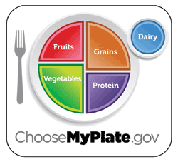 We've heard the time-tested slogan "Milk, it does a body good!" Well, new research from the University of Maine can add "Milk, it does a brain good, too!"
We've heard the time-tested slogan "Milk, it does a body good!" Well, new research from the University of Maine can add "Milk, it does a brain good, too!"Nature's perfect food has been shown to provide essential nutrients to the diets of young children and adults. Examples include protein, calcium, magnesium, potassium, phosphorus, zinc, riboflavin, Vitamin A, vitamin D, and Vitamin B12. These nutrients have provided health benefits such as building strong bones, and reducing the levels of obesity, diabetes, and hypertension.
Research was conducted by University of Maine psychologist/epidemiologist Merrill "Pete" Elias and psychologists Michael Robbins and Gregory Dore. They collaborated with a researcher at the University of South Australia, as well. Studies were conducted on 972 men and women between the ages of 23 and 98. These individuals underwent a series of tests to evaluate their brains' abilities. There was a series of tasks including memory challenges and concentration tests.
The studies showed that those drinking at least one glass of milk per day were more successful in the tasks and scored higher on tests. This applied to all age ranges. In some tests, adults who rarely consumed dairy products were five times more likely to fail compared with those who had dairy products even just two to four times a week. This study was published in the International Dairy Journal.
The study also took into consideration other factors that could adversely affect brain health (poor diet and heart health). In all eight tasks, the highest scores went to those with the highest intake of milk and dairy products. Coincidence? We think not.
This type of mental evaluation of milk drinkers had not been done before. Previous research focused on the physical benefits of milk, such as stronger bones, lower blood pressure, lowering type 2 diabetes, and improving heart health.
 USDA's MyPlate recommendation of three servings of dairy per day demonstrates the value that milk needs to play in a healthy diet. And with milk's unique ingredient combination, it is the top source for three of the most underconsumed nutrients (calcium, vitamin D, and potassium). With new and emerging brain benefits to milk consumption, coupled with the obvious physical health advantages, consumers of all ages can take advantage of both the body and mind enhancements milk and dairy products can add to their lives.
USDA's MyPlate recommendation of three servings of dairy per day demonstrates the value that milk needs to play in a healthy diet. And with milk's unique ingredient combination, it is the top source for three of the most underconsumed nutrients (calcium, vitamin D, and potassium). With new and emerging brain benefits to milk consumption, coupled with the obvious physical health advantages, consumers of all ages can take advantage of both the body and mind enhancements milk and dairy products can add to their lives.








